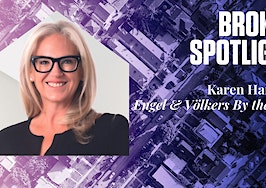New markets require new approaches and tactics. Experts and industry leaders take the stage at Inman Connect New York in January to help navigate the market shift — and prepare for the next one. Meet the moment and join us. Register here.
Is it just me or have team structures become so convoluted that it’s hard to keep up with who’s doing what with and for whom anymore?
With the exception of individual agents — an increasingly rare breed, it would seem — teams, teamerages, brokerages and expansion teams seem to be proliferating in so many shapes and sizes that it’s becoming difficult to keep them all straight.
This calls into question what happens when publications and organizations try to rank them, differentiating between different teams and brokerages. When I talk to team leaders and brokers in the industry, they’re confused and often frustrated because they spend half their time explaining to the powers that be at these organizations who they are, how they’re structured, and how they should be evaluated for ranking purposes.
When it comes to rankings for 2023, we’re probably already too late. RealTrends has their submission portals live with the countdown clocks ticking. They include classifications for team sizes from small (two to five agents), medium (six to 10 agents) and large (11-20 agents) all the way up to mega with 21+ agents.
Last year, Christy Murdock wrote an Inman Handbook laying out the various types of team structures and NAR had an explainer on the teamerage model just a couple of weeks ago. They also have information on teams and some of the legal issues surrounding them.
Definition of a team
According to NAR, a team is
“comprised of two or more real estate salespeople who pool resources on marketing, administrative staff, and may offer specialists for various aspects of the real estate business. In some cases, a team can appear to operate as a separate brokerage firm to consumers.”
Definition of a brokerage
When I tried to look this up, I found a lot of definitions for broker, but not many for brokerage. Even the dictionary definition is just in relation to the broker i.e. “the business or establishment of a broker.”
That leaves us looking at all the different types of brokers out there. Some are hands-on, still in production and, as it were, in competition with their own agents. Others have no production and massively support their agents through the content and services they provide.
How does it impact a broker’s role when that broker is running a team and focusing on that team’s production? How does it impact the way that broker relates to the agents who are not on that team and the way those agents feel about their leadership?
Different iterations of the team model
Aaron Kirman’s recent departure with more than 160 agents from Compass to Christie’s is a prime example. His team will become a brokerage that operates in partnership with Christie’s. The move comes at a time when competition for talent is more intense than ever.
Similarly, Ryan Serhant previously led a team, now he leads a brokerage, SERHANT. Where does his production get counted?
Some team leaders are running “expansion teams” in multiple states and sometimes under multiple brands that are bigger than most indie brokerages and bigger than some franchises, yet they are still considered teams. I’m not sure how that math works.
Here’s how Brett Jennings of Silicon Valley’s Real Estate Experts broke it down for me:
The factors that have traditionally indicated the difference between team and brokerage were compensation and origination of business. “Traditional teams customarily pay their agents lower splits,” Jennings said, “but in return, they generate more of the business.”
In that model, the team leader “is generating at least 50 percent of the business” that the agents on the team are transacting, Jennings said.
By contrast, most brokerage models provide a higher split to agents but the agents have to generate most or all of the business.
Similarly, there’s the teamerage model — meant to combine the best of both teams and brokerages, as the name suggests — where teams continue to expand, with a de facto team leader at the head, and multiple teams under them. Apparently, because there’s a managing broker who’s not the team leader, it’s not a brokerage, so it’s a team.
In “the hybrid model of a teamerage … the broker provides company-generated opportunities for a referral fee and what we have seen is that we are able to justify paying the agents lower splits, but they are expecting to see 20 percent to 30 percent of the business generated to come from the company,” Jennings said.
So when it comes to rankings, what about those other teams, the subordinate teams? Do they just get left out in the cold when it comes to their team’s size category? According to a lot of mega-team leaders, the answer is a resounding “Yes.”
When it comes to the power rankings, how do they differentiate between teams and brokerages? Should they do so? Does it skew the rankings when you have top teams included in the RISMedia’s Power Broker Report?
Look at the example of Kenny Fast of Fast Real Estate. LuxeSF List used the RealTrends data to formulate their list, but didn’t consider him or Brett Jennings of Realty Experts in their list.
Why do accountants like numbers? Because numbers don’t lie. But then why are the rankings so broken? Or wrong?
I’m at Side, but that doesn’t make me a team under them. Doora is my own independent brand under Side as the brokerage. I don’t qualify as a team for team rankings, though many mega-teams do qualify for brokerage rankings.
Getting the lowdown on the ranking conundrum
I’m always a bit leery of writing about topics like this, because inevitably people will assume that it’s sour grapes on my part. My previous brokerage had the numbers to rank but we never submitted.
That’s why I wanted to reach out to others in the industry and see what their takes were. I wanted to check myself and make sure I was looking at the issue fairly.
I first reached out to Josh Altman of Million Dollar Listing LA fame. He’s also part of the top-ranked team in California last year with $1.464 billion in sales. I asked him if the system was broken. He said the rankings have gotten so out of hand that it really has become a marketing tool more than anything else.

Josh Altman
“Everyone claims to be the top Realtor at the top brokerage. Everyone’s listing package always says they are No. 1. Every week a new record is broken per agents’ Instagrams. If you sell a house for the most money on a block with six other houses, then you can claim you broke the record for the highest sale ever in that street. It’s become comical.
I know agents who acquire a team with $100 million in sales that calendar year in a new area they have never sold in personally and the next day they are claiming they sold $100 million in that area.
Unless you physically walk through these listings, market these listings, show the houses, negotiate the deals, then you shouldn’t be able to call them yours. Every dollar of the $1.464 billion we sold last year, I touched.”
Byron Lazine, Inman contributor, co-host of The Real Word on Broke Agent Media, and broker at One Team at William Raveis Real Estate, had this to say:

Byron Lazine
“Teams should have a clear definition. I don’t see how there can be multi-state teams. For one, it breaks the rules on most state rules and MLSs. To be a team and a brokerage, you should have to be all or nothing. A teamerage, which really should be its own category, should operate as a team only. If they have other categories, then they are a brokerage.
There has always been manipulation or bending the rules to win awards. It’s up to the people handing out these awards to have clear rules that everyone can understand. If they don’t do that, then it comes off as a money grab and nobody really takes it that seriously.”
According to Dan O’Neil of The O’Neil Team:
“I also believe the ranking and award system needs tweaking, both industrywide but also brokeragewide. It’s not fair to some agents who don’t receive recognition because they are under someone’s name.
It’s also unfair to rank a 50-person team with 15 staff members and 6 ISA’s across multiple states with a team of, say, 10 or 12. Or 100 agents and staff versus 30.”
O’Neil also believes there needs to be a stronger vetting process for rankings and awards, though he’s not sure what those specific changes would entail.
Part of the confusion comes in during the initial submission process. According to Spyglass Realty’s Ryan Rodenbeck:

Ryan Rodenbeck
“I think that the way that these rankings are given from RealTrends is very confusing. I have over 100 agents. At least 40 of them participate in our leads program. Theoretically, based on what I’ve seen, I could input my company as a team. I think that would be misleading.
Instead, I put my company in as an “Independent Brokerage”. But what does that mean? To me, an independent brokerage is one that is owned by one person or a partnership of a few people.
I’m proud to have made the list of top 500 independent brokerages with Real Trends, but when I looked at the number one and number two on the independent list, I see EXP and Compass. How are those publicly traded companies considered independent?
As teams and brokerages and teamerages have evolved in recent years, I think the way we rank them should also evolve. I think there needs to be more definition with how we are all ranked.
I personally believe teams that count other agents’ volume (that aren’t actually on the team) should not be able to add those agents’ volume to their total. That would be tough to police but there should at least be a baseline. I also believe that the “independent” category should be re-defined as a brokerage that is independently owned and not publicly traded.”
Of course, what’s frustrating about all of the ambiguity when it comes to categories and rankings is that some people will work hard to game the system. According to Melissa Sofia of The Avenue Home Collective:

Melissa Sofia | Credit: The Avenue Home Collective
“The problem is that there is so much trickery around rankings these days. Every app, every publication, every association provides rankings and it creates so much consumer confusion around who is really the “Best” or at the “Top” of their market.
If RealTrends wants to be the most accurate ranking resource in the nation, it has to innovate its categories to mirror how Realtors’ business models have changed over the years. Right now, there is no truly accurate rankings that agents and brokerages can rely on to measure their success.”
Straight from the source: Clayton Collins of HW Media
I agreed and reached out to Clayton Collins of HW Media. Talking to him about the HousingWire RealTrends rankings offers us a glimpse into the other side of the ranking process and gave me a new insight into the care and thought that goes into crunching these numbers in the face of this much rapid industry evolution.

Clayton Collins
How do we look at the categories and ranking systems and say, ‘Let’s level the playing field?’
The model iteration is wild. They keep our RealTrends team on their toes iterating on the categories and measurement every year. Teams are now required to submit P&Ls every year to make sure we can see that we’re comparing apples to apples. It’s cool to see the evolution, but you have to constantly evolve with it.
Is it time for teamerage to have its own category?
It’s something we’ve talked about with our team and our third-party verifiers. We’re continually looking for new ways to improve methodologies and redefine categories to match the current market landscape.
RealTrends previously ranked team-owned brokerages and discontinued that category in 2020. We learned through the data that ownership information was fuzzy, changed frequently, and that the ownership structure wasn’t always an accurate view of team structure.
What about two teams merging at the end of the year? Would they be seen as one team for rankings even if they weren’t together all year on their production?
I guess we’d look at that as an outlier scenario. Hopefully, people aren’t doing that purely for the ranking, but that’s something we’d be able to see [from the P&L].
One thing we can be confident in is that the evolution we’ve seen in the last two or three years will continue into the next few years. So we want programs that will continue to evolve. We rank in different size categories to avoid a race towards scale as a way to avoid size being the only way people are recognized.
P&L evaluation also helps us to see differences between a brokerage and a true team. Verification also helps us to see how teams and teamerages are working with vendor partners which helps to provide guardrails to keep the programs as honest as possible.
There’s a lot we’re excited about for the upcoming rankings season. Our new data infrastructure allows us to spot reporting irregularities early. So if a team, teamerage or individual agent has a notable change in reporting or jumps to a new category, we have historical data to flag the submission and dig deep into accuracy.
We have also built out financial analysis protocols that require submission of financial information so we can complete analysis of specific financial ratios, giving a glimpse into financial trends but also creating guardrails for business model irregularities. The guardrails are critical.
Final thoughts
One more thing that Collins mentioned? As RealTrends continues to make adjustments, they find that independent brokerages present one of their biggest challenges. “We’re working hard to get them into the nomination process so they can reflect that part of the ecosystem,” Collins said.
Perhaps, then indies and teamerages should be their own categories, creating a truer picture of the evolving state of the industry.
It’s great to see how much compassion and research goes into the process of creating these lists. Now, how do we continue to move forward and continue to evolve the rankings and ensure that they are a true reflection of the state of the industry and the expertise of those who lead it?
I am grateful to those who went with me on this journey and helped me to think through all of the varied perspectives. There are no easy answers but I hope this sparks a conversation. I think it’s an important one to have and it’s about time to have it.
Troy Palmquist is the founder and broker of DOORA Properties in Southern California. Follow him on Instagram or connect with him on LinkedIn.













